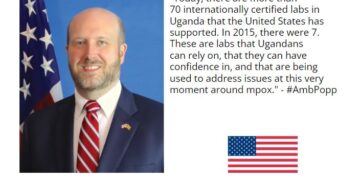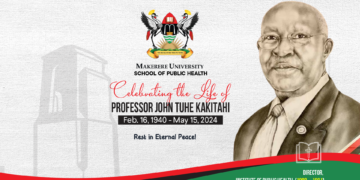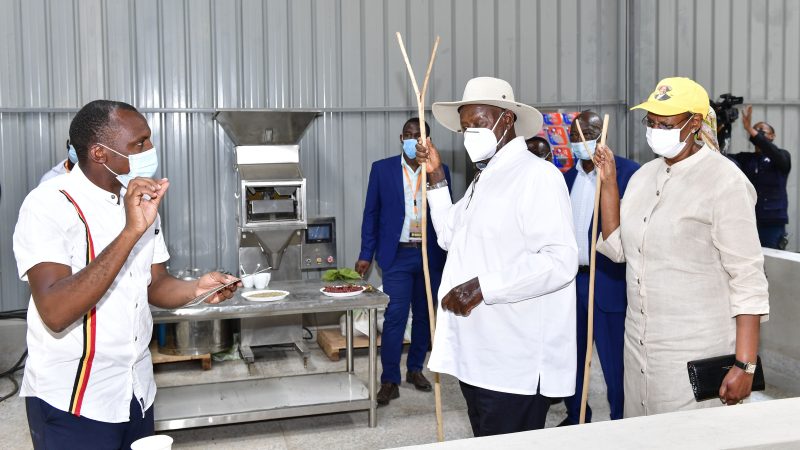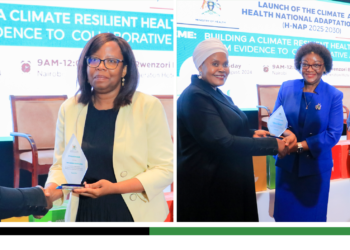Mbarara, Uganda – A researcher at Mbarara University of Science and Technology (MUST) in Uganda, has won a $3 million (Shs. 11 billion) research grant for her work on maternal health care.
The news has been announced on the University’s grants website, which can be accessed here.
This significant achievement is by Dr. Esther Cathyln Atukunda, a Senior Lecturer in the Faculty of Medicine, who has secured the remarkable research grant for the next five years.
According to the story, the grant which is titled “Integration of a patient-centered health intervention (Support-Moms) into routine antenatal care to improve maternal health in Uganda” will last for five years.
Dr. Atukunda, who serves as the Principal Investigator and Project Director, has demonstrated her dedication to research and improving healthcare outcomes over the last decade.
Her work has focused on investigating user-centered and appropriate medicine and intervention use in low-resource settings.
She has employed various research methods, including observational studies, surveys, cost-effectiveness modeling, and randomized controlled trials, all with the aim of enhancing maternal and child health in Uganda.
To her credit, she has co-published this work in over 60 peer-reviewed high-impact journals, globally.
This prestigious grant builds upon Dr. Atukunda’s previous work, developed under the mentorship of esteemed figures such as Prof. Celestine Obua, Dr. Godfrey Mugyenyi, Prof. Jessica Haberer, Prof. Mark Siedner, and Dr. Lynn Matthews.
“Notably, this achievement marks the second PRIME R01 grant ever awarded in Uganda and the very first PRIME RO1 grant at MUST,” the story reads.
According to the story, the grant was awarded on the first attempt, achieving an outstanding score of 10, with a percentile score of 1.0%.
Background
The remarkable grant seems to have stemmed from one of Dr. Atukunda’s publications which is co-authored with several scholars.
The study is titled: Evaluating the Feasibility, Acceptability, and Preliminary Efficacy of SupportMoms-Uganda, an mHealth-Based Patient-Centered Social Support Intervention to Improve the Use of Maternity Services Among Pregnant Women in Rural Southwestern Uganda: Randomized Controlled Trial. The study was published in November 2021 in the prestigious JMIR Formative Research journal which publishes peer-reviewed, openly accessible research papers containing results from process evaluations, feasibility/pilot studies, and other kinds of formative research and preliminary results.
Her co-authors were: Mark J. Siedner, Celestino Obua, Angella Musiimenta, Norma C Ware, Samuel Mugisha, Josephine N Najjuma, Godfrey R. Mugyenyi, and Lynn T. Matthews.
These scholars are affiliated with various institutions such as Havard School of Medicine, Birmingham University, and Mbarara Univerisity of Science and Technology.
The Details
The study aimed to assess the potential benefits of a novel mobile health (mHealth) messaging app, known as SupportMoms –Uganda, for pregnant women in Uganda. This app was designed using behavioral science frameworks to enhance the use of maternity services.
The app, known as SupportMoms-Uganda, represents a patient-centered and audio-based solution designed to empower and assist women in accessing essential maternity care services.
This study was conducted through a pilot randomized controlled trial from August 2020 to May 2021 at a referral hospital in Southwestern Uganda.
Accordingly, the main objectives were to evaluate the feasibility, acceptability, and preliminary effectiveness of the messaging app.
The participants, pregnant women, were divided into three groups: one receiving routine antenatal care (control), another receiving scheduled SMS text or audio messages (scheduled messaging [SM]), and the third group receiving SM along with SMS text reminders sent to two social supporters chosen by the participants.
The study examined various outcomes, including the feasibility and acceptability of the messaging prototype, Antenatal care attendance, skilled delivery rates, and the impact on social support.
Qualitative exit interviews were conducted to delve deeper into the mechanisms behind the intervention.
Then they determined whether this mHealth app could effectively support and encourage pregnant women to utilize maternity services, ultimately improving maternal and child health outcomes in the region.
Research Findings
The study, which assessed the feasibility, acceptability, and effectiveness of the app, yielded highly promising results.
Over 80% of women received more than 85% of the intended messages within one hour, highlighting the app’s feasibility and acceptability.
Remarkably, over 90% of the women found the intervention useful, easy to use, interesting, appropriate, engaging, and compatible with their needs.
“Nearly all women in the study who used the app had a skilled delivery, compared to lower rates in other groups,” the scholars reported.
The authors concluded that the app’s success can be attributed to its tailored and targeted approach, delivering scheduled, customized, and precautionary messages in a friendly tone at preferred times of the week.
“Women reported that these messages were motivating and encouraging. The app also facilitated the sharing of health information with significant others, improving informed decision-making and encouraging partner involvement in maternal care.”
According to the authors, the study’s findings indicate the need for further evaluation and integration of this mHealth-based intervention into routine care, with the hope of revolutionizing maternal-perinatal health outcomes in Uganda and potentially serving as a model for similar settings.
Our Verdict
This patient-centered mHealth intervention is a beacon of hope for rural pregnant women in Uganda, offering them access to timely and credible health-related information through customized mobile messaging.
The success of the SupportMoms-Uganda app demonstrates the potential for innovative technology to bridge information gaps, provide continuity of care, and significantly improve maternal and child health outcomes in underserved communities.
The grant might have come at the right time when the scholars hoped to implement the integration of this mHealth-based intervention with the hope of improving maternal health care in Uganda.
For more on this study, visit: https://formative.jmir.org/2021/11/e29214/














































This research has very interesting findings that are easily applicable in our settings with high impact and trends on the current society, if t can be rolled out to the entire country of Uganda and other low income countries to assess it generalizability.
Very grateful
A great resource that scores as, “useful, easy to use, interesting, appropriate, engaging, and compatible with their needs.” Presenting all the vital information in a friendly, timely and convinient way is an answer to a long overdue quest. Thanks and congratulations to Dr. Esther Atukunda and your resilient team.
We look forward to rolling it out and spreading even to other regions of the country.
Thanks Mr.Rugyendo for the detailed and informative review. You have always entertained, informed us and kept us on the know. Thanks always.
Thank you Nicholas!
This is really encouraging. Thank you Dr. Atukunda.